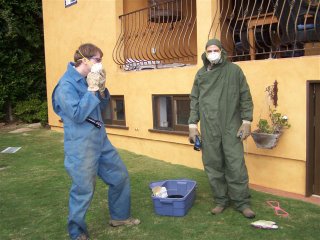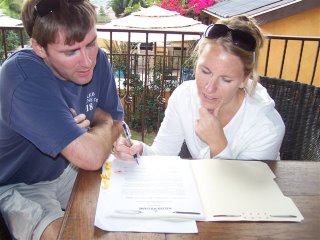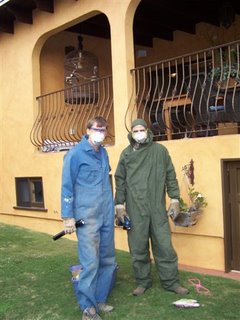‘The Physical Inspection’ Of Your Potential "Sweet or Sour Home"
One of the most important aspects of a real estate transaction is the physical inspection of the property that you are contemplating making your “Home Sweet Home”. 

The physical is normally performed after an accepted offer. However, in some cases, it can be preformed prior to committing to placing 3% of the sale price into escrow and other costs as in appraisal for your loan. On purchases when you are dealing directly with the bank or a trust they may require that you perform the physical inspection prior to opening escrow and waiving your physical inspection contingency.


I can’t stress the importance of finding a qualified, certified and experienced inspector. Even if the inspector has been referred by a friend or family member, take the time to interview them prior to hiring. What will they and what won’t they be doing for you? Do they take photos and give you a detailed print out at the inspection? Do they have a sample inspection report that they could forward to you? Some inspectors even give you a disc with photos and descriptions of problems or potential problems, they print a copy for you, your realtor and the realtor representing the seller. In my opinion, the best inspectors have had some background in construction and/or engineering.
Some of the areas that they normally inspect are:
1) All of the electrical outlets
2) The plumbing system for pressure and any visual problems. They should let you know if the plumbing system is cooper or galvanized.
3) The roof for any signs of leaks or problems that could cause leaks. In addition to calculating the age of the roof.
4) All of the appliances. They will run them during the inspection making sure they operate properly.
5) The heating and air conditioning system.
6) Windows.
7) The foundation for any cracks, or other potential problems.
8) The water heater and smoke detector positioning.
9) They make notation of termite or dry root problems, however, the termite inspector is the expert for this task.
10) They should share with you if any additional specialist should be called to inspect a specific area of the property.

So as you can see, they have a very detailed job to do. In my experience, a good inspector normally takes around 3-4 hours to inspect a property between 1,200 and 3,000 square feet. An estate property could take all day.
This is also a great time to get to know the house, since you will be spending several hours there during the inspection. You should try to be at the inspection for at least apart of it; especially at the end. The inspector normally goes over his report pointing out how to operate certain things and how to maintain them.

As you can see, in some of the photos I have provided, we also exchange documents and any other paper work that needs signatures…lots and lots of paper…lots and lots of signatures, the realtor representing the buyer is there to hold the buyers hand and explain some of the detailed paperwork. At this inspection, the husband decided that he wanted to venture underneath the home with the inspector…check out the gear needed to be safe will checking out the foundation and other very interesting things underneath.
After analyzing the report and spending time at the property…checking out the neighbors and traffic sounds…this is the time that you can either request that the seller perform some needed repairs, or if you feel that you’ve gotten a hell of a deal…the next step is usually finalizing your loan.

Just remember how important it is to check out your inspector…because if your inspection isn’t meticulous you WILL pay later.
If you have any questions feel free to post a comment or email me directly at micheleblackmon@prodigy.net


The physical is normally performed after an accepted offer. However, in some cases, it can be preformed prior to committing to placing 3% of the sale price into escrow and other costs as in appraisal for your loan. On purchases when you are dealing directly with the bank or a trust they may require that you perform the physical inspection prior to opening escrow and waiving your physical inspection contingency.


I can’t stress the importance of finding a qualified, certified and experienced inspector. Even if the inspector has been referred by a friend or family member, take the time to interview them prior to hiring. What will they and what won’t they be doing for you? Do they take photos and give you a detailed print out at the inspection? Do they have a sample inspection report that they could forward to you? Some inspectors even give you a disc with photos and descriptions of problems or potential problems, they print a copy for you, your realtor and the realtor representing the seller. In my opinion, the best inspectors have had some background in construction and/or engineering.
Some of the areas that they normally inspect are:
1) All of the electrical outlets
2) The plumbing system for pressure and any visual problems. They should let you know if the plumbing system is cooper or galvanized.
3) The roof for any signs of leaks or problems that could cause leaks. In addition to calculating the age of the roof.
4) All of the appliances. They will run them during the inspection making sure they operate properly.
5) The heating and air conditioning system.
6) Windows.
7) The foundation for any cracks, or other potential problems.
8) The water heater and smoke detector positioning.
9) They make notation of termite or dry root problems, however, the termite inspector is the expert for this task.
10) They should share with you if any additional specialist should be called to inspect a specific area of the property.

So as you can see, they have a very detailed job to do. In my experience, a good inspector normally takes around 3-4 hours to inspect a property between 1,200 and 3,000 square feet. An estate property could take all day.
This is also a great time to get to know the house, since you will be spending several hours there during the inspection. You should try to be at the inspection for at least apart of it; especially at the end. The inspector normally goes over his report pointing out how to operate certain things and how to maintain them.

As you can see, in some of the photos I have provided, we also exchange documents and any other paper work that needs signatures…lots and lots of paper…lots and lots of signatures, the realtor representing the buyer is there to hold the buyers hand and explain some of the detailed paperwork. At this inspection, the husband decided that he wanted to venture underneath the home with the inspector…check out the gear needed to be safe will checking out the foundation and other very interesting things underneath.
After analyzing the report and spending time at the property…checking out the neighbors and traffic sounds…this is the time that you can either request that the seller perform some needed repairs, or if you feel that you’ve gotten a hell of a deal…the next step is usually finalizing your loan.

Just remember how important it is to check out your inspector…because if your inspection isn’t meticulous you WILL pay later.
If you have any questions feel free to post a comment or email me directly at micheleblackmon@prodigy.net



2 comments:
How are inspectors trained for the job?
Just as becoming a realtor, home inspectors go through a series of courses that prepare them for inspecting both homes and commercial buildings. The National Association of Certified Home Inspectors NACHI, is one of the organizations that offer membership, training and education to future and on going education for seasoned home inspectors. Some of the courses that inspectors take are: Codes of ethics, roofing inspection, electrical inspection, foundation etc. etc. The NACHI offers a Consumer Information Center for the general public, that offers updated info on Child Safety, Recalls, Pollutants, Insulation info, Private water wells, Holiday Safety tips, Home Insurance, Rehabing your home and more in addition they have a toll free number 877.FINDINS to find a certified inspector in your area.
Hopefully this will help you...
Michele
Post a Comment